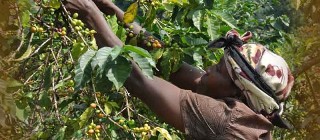Swiss firm eyes South Sudan for coffee production
July 20, 2013 (TORIT) – The global Swiss coffee firm, Nespresson is to champion coffee production in South Sudan as one way of stopping the country’s over reliance on oil as its main revenue source.

“There is a real opportunity here,” an official from Eastern Equatoria quoted Clooney saying.
Clooney who is a brand ambassador for Nespresson said coffee has great potential for South Sudan when compared to oil.
“There is only one product coming from South Sudan right now, that’s oil, and the problem (with) oil is that someone, a company, takes the oil from the ground, beneath the feet of the actual people who put (it) there, put it in a pipeline… and they sell it. It (the money) doesn’t seem to trickle back down to the people,” he observed.
The Nespression ambassador admitted that it will take ‘‘a lot of work’’ before South Sudan can begin exporting coffee as the country still lacks infrastructure such as roads.
A Nespresso spokesman was quoted saying coffee plantations will be developed near the town of Yei in Central Equatoria, on the Boma plateau in Jonglei and in the Imatong Mountains in Eastern Equatoria state.
“The goal is for the first South Sudan capsules to hit the market in 2015,” he reportedly said.
Awelo Obaale, the deputy director for mechanization, crop production and irrigation in the Eastern Equatoria state ministry of agriculture was delighted upon hearing that Nespresso will buy the young nation’s coffee.
60-year old man was a coffee manager for two decades in the former district of Torit. To him, coffee provides an opportunity for South Sudan to diversity its economy by developing cash crop production.
‘‘With private investors it will do better and generate hard currency and improve livelihood of the people and economy,” he said.
He further disclosed that officials from the Swiss-based company were in the state earlier this year and took some coffee sample from the region.
In the 90s, Obale recalled, coffee grown in Hatire, Gilo in Ikwoto County, Obbo, Lerua, Palwar in Magwi County and from Nagishot in Budi County reportedly earned the Sudanese government enormous hard currency with a bag then going for as much as 500 pounds.
“Coffee production will eventually replace oil which he believes will be depleted in the future,” he said.
South Sudan took with it nearly 75% of the oil it previously shared with Sudan when it broke away from the latter in January 2011. Previously, revenues from oil supported about 98% of the country’s budget.
(ST)
